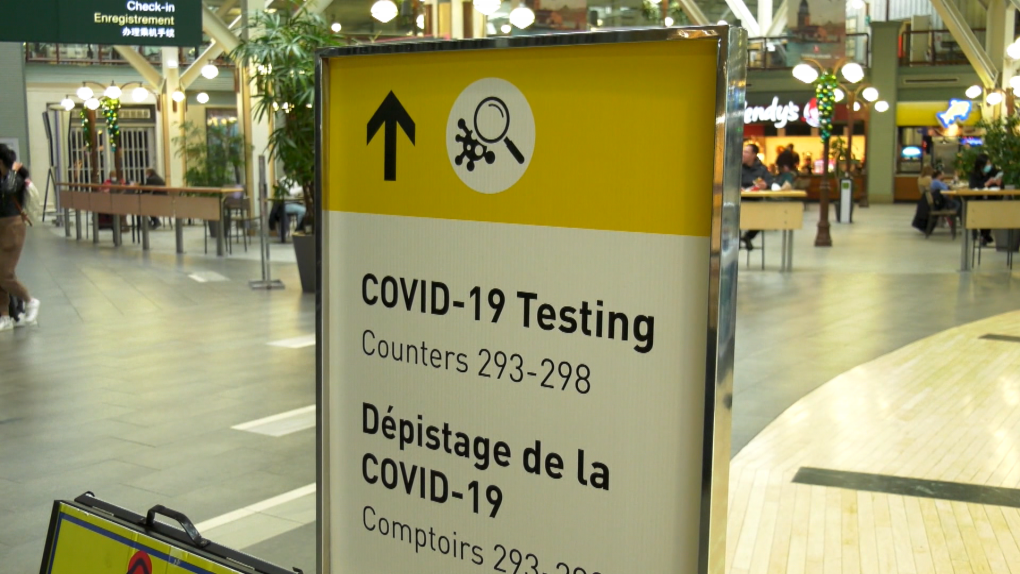B.C. travel industry seeking clarity on impact of latest federal advisory
The latest federal travel advisory announced in the middle of the holiday season has created confusion and uncertainty for would-be travellers and the travel industry alike.
The federal government announced the advisory against all non-essential international travel on Wednesday, citing growing global concerns around the Omicron COVID-19 variant. The advisory is currently expected to remain in place for four weeks, officials said.
Hours after the announcement, Marivic Cregan, co-owner and manager of New West Holiday Trips, told CTV News her travel agency is waiting to hear from insurers, airlines, and travel suppliers about what this advisory change may mean.
She also expected to field questions from a lot of people who have already made travel plans.
“This is déjà vu from what we’ve done over and over,” she said. “I think we’re just booking and rebooking, and rebooking and rebooking. And we don’t know when this is going to end. It’s an invisible enemy out there.”
She said helping customers navigate the many new rules surrounding travel has become part of their routine, and these days booking a trip requires a detailed discussion as it is.
“For some people, they’re vaccinated, they’re triple vaccinated, maybe that will give them a sense of confidence, a cushion,” she said. “But for some people, maybe not. So we will respect whatever decision.”
Cregan noted many tour companies and airlines now have more flexibility where cancellations are concerned, however receiving a credit may be the only option for a deferred trip.
She also suggested people get in touch with their travel insurance providers regarding the travel advisory change.
“Whatever decision you make, think of your safety, think of the other people around you, think of how it’s going to affect everyone,” she said, and added people need to assess the risk for themselves and make an informed decision. “We’re in a pandemic, and we’re going to be in it for the next couple of years, and the world can’t stop.”
Canada 150 research chair and SFU mathematics professor Caroline Colijn said while the travel advisory may influence some people to change their plans, it won’t prevent Omicron from being introduced into Canada.
“That ship has sailed,” she said. “Omicron is already here, it’s set to be the predominant type of COVID in Ontario this week. People have said it will likely be the vast majority of COVID cases in Ontario by the end of the week. It’s also been observed here in B.C., and in Alberta, and other places. So reducing international travel will not stop Omicron from being in Canada and from rising very rapidly in Canada, as it’s already doing.”
The infectious disease modeller said there may be greater benefits for destinations.
“We may prevent Canadians from seeding Omicron outbreaks in other places,“ Colijn said, who added that expected potential cases from travel would not have the largest impact within Canada at this point. “If something is doubling within our country...at a doubling time of two to four days, most of our transmission will be local, and so the role of a few more introductions will be relatively minor.”
Colijn said it does appear to be a recognition by the federal government that this variant is unlike the ones we’ve seen before.
“It’s rising faster than Alpha, it’s rising faster than Delta, and it shows some ability to get into vaccinated individuals, and that’s of course concerning,” she said. “We hope that the severity won’t be such that it’s really severe in vaccinated people.”
Colijn added the sheer number of cases with this variant could become an issue, even if fewer of them require hospitalizations.
“I think we do need to be bracing for that within public health systems because there’s a high risk that those health care systems could again be overwhelmed,” she said. “There’s a case for flattening the curve, getting back to the language of the start of the pandemic: having smaller gatherings, wearing the best masks you can, getting vaccinated.”
Must Watch
Top Videos
CTVNews.ca Top Stories

UPDATED | PM Trudeau says he thinks Trump is using talk of Canada becoming 51st state to distract from tariff impact
Prime Minister Justin Trudeau says he thinks U.S. president-elect Donald Trump is drumming up drama on Canadian statehood to detract from tariff talks.
4 min ago
LIVE UPDATES Here's the latest on the most destructive fire in L.A. County history
A series of wildfires are tearing through densely populated parts of the Los Angeles, Calif. area. Five people have been reported dead. U.S. Gov. Gavin Newsom says thousands of resources have been deployed to contain the fires.
4 min ago
More than 150 students sick at University of Guelph, says public health
More than 150 cases of gastroenteritis have been reported at the University of Guelph.
1 hour ago
Multiple Chinese warships track Canadian HMCS Ottawa through the South China Sea
The silhouettes of a hulking Chinese Navy destroyer dubbed 'Changsha' and a warship called the 'Yuncheng' can been seen hovering along the horizon, mirroring HMCS Ottawa’s movements.
5 hours ago
Canadian travellers now require an ETA to enter U.K. Here's what to know
Starting Jan. 8, Canadians visiting the U.K. for short trips will need to secure an Electronic Travel Authorization (ETA) before boarding their flight, according to regulations set out by the U.K. government.
5 hours ago
'True when I said it, true today': former Canadian PM Harper pushes back against Trump on social media
Former prime minister Stephen Harper doesn’t find U.S. president-elect Donald Trump’s jibes about Canada becoming the 51st U.S. state very amusing.
Toronto police investigating parental abduction, three-year-old boy believed to be in India
A parental abduction investigation is underway after a father allegedly failed to return to Canada with his three-year-old son after a trip to India, Toronto police say.
4 hours ago
California's insurance is in crisis. The solution will cost homeowners a ton
Lynne Levin-Guzman stood in the front yard of her 90-year-old parents’ home in Los Angeles County, California, trying to protect it with a garden hose — because their insurance company no longer would.
1 hour ago
UPDATED | As wildfires rage in Los Angeles, Trump doesn't offer much sympathy. He's casting blame.
As cataclysmic wildfires rage across Los Angeles, President-elect Donald Trump hasn't been offering much sympathy. Instead, he's claiming he could do a better job managing the crisis, spewing falsehoods and casting blame on the state's Democratic governor.
33 min ago






























































